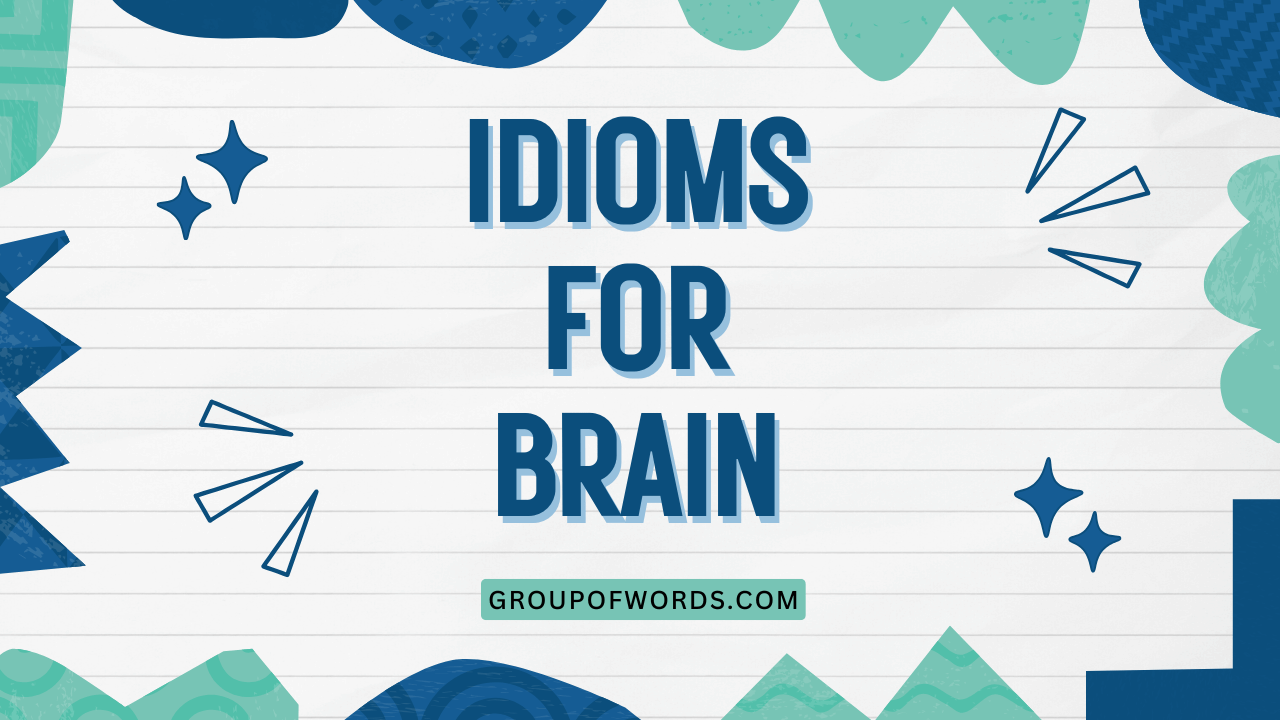Brainy Idioms: Mastering English Expressions for Intelligence
Idioms are an integral part of the English language, adding color and depth to everyday conversations and written communication. Among the most intriguing are idioms related to the brain and intelligence.
Understanding these expressions not only enhances your vocabulary but also provides insights into how native English speakers conceptualize intellectual capabilities. This article will explore a wide range of idioms related to the brain, their meanings, origins, and usage, helping you to confidently incorporate them into your own speech and writing.
This is especially beneficial for ESL students, writers looking to enrich their prose, and anyone interested in the nuances of the English language.
This comprehensive guide is designed to equip you with the knowledge and skills to effectively use idioms related to the brain and intelligence. We’ll delve into the definitions, structural breakdowns, examples, usage rules, common mistakes, and provide practice exercises to solidify your understanding.
By the end of this article, you’ll have a robust grasp of brainy idioms and be able to use them with precision and flair.
Table of Contents
- Definition of Brain Idioms
- Structural Breakdown of Brain Idioms
- Types and Categories of Brain Idioms
- Examples of Brain Idioms
- Usage Rules for Brain Idioms
- Common Mistakes with Brain Idioms
- Practice Exercises
- Advanced Topics in Brain Idioms
- Frequently Asked Questions
- Conclusion
Definition of Brain Idioms
Idioms are expressions whose meanings cannot be understood from the literal meanings of the individual words within them. Instead, they carry a figurative or symbolic meaning that is culturally recognized.
Brain idioms, specifically, refer to expressions that relate to intelligence, mental capacity, thinking processes, and understanding. These idioms are often used to describe someone’s intellectual ability, their mental state, or the act of thinking itself.
They contribute significantly to the richness and expressiveness of the English language.
Brain idioms can be classified based on the specific aspect of intelligence they represent. Some idioms describe high intelligence or cleverness, while others describe a lack of intelligence or foolishness.
Still others refer to the act of thinking, remembering, or understanding. The function of these idioms is to add color and nuance to descriptions of mental abilities and processes, making language more engaging and relatable.
They are frequently used in both formal and informal contexts, adding a layer of meaning that goes beyond literal interpretation.
Structural Breakdown of Brain Idioms
Brain idioms, like all idioms, are fixed expressions, meaning that their structure and wording cannot be altered without changing or losing their intended meaning. These idioms often consist of a combination of nouns, verbs, adjectives, and prepositions that, when combined, create a unique figurative meaning.
Understanding the structural elements of these idioms can help in recognizing and remembering them.
Many brain idioms follow common structural patterns. For example, some are based on metaphors, comparing the brain to a physical object or process.
Others use exaggeration or understatement to emphasize a particular aspect of intelligence. Still others rely on cultural associations and shared understanding to convey their meaning.
By analyzing these structural patterns, learners can gain a deeper appreciation for the creativity and complexity of brain idioms.
Types and Categories of Brain Idioms
Brain idioms can be categorized based on the specific aspect of intelligence or mental function they describe. Here are some common categories:
Idioms for High Intelligence
These idioms describe someone who is very smart, clever, or intelligent. Examples include “brainy,” “sharp as a tack,” and “quick on the uptake.”
Idioms for Lack of Intelligence
These idioms describe someone who is not very smart, foolish, or unintelligent. Examples include “not the sharpest tool in the shed,” “a few sandwiches short of a picnic,” and “out to lunch.”
Idioms for Thinking and Understanding
These idioms describe the act of thinking, remembering, or understanding something. Examples include “rack one’s brain,” “put one’s thinking cap on,” and “get one’s head around something.”
Idioms for Mental State
These idioms describe someone’s mental state or condition. Examples include “brain dead,” “out of one’s mind,” and “scatterbrained.”
Examples of Brain Idioms
To illustrate the usage of brain idioms, let’s explore examples categorized by their respective meanings. These examples will help you understand the context in which each idiom is typically used, allowing you to incorporate them effectively into your own communication.
Idioms for High Intelligence
The following table provides examples of idioms used to describe high intelligence, along with their meanings and example sentences. These idioms often convey a sense of quick wit, deep understanding, and exceptional mental ability.
| Idiom | Meaning | Example Sentence |
|---|---|---|
| Brainy | Very intelligent; having a high level of intellectual ability. | She’s the brainy one in the family, always excelling in academics. |
| Sharp as a tack | Very intelligent and perceptive. | He’s as sharp as a tack; he can solve any problem you throw at him. |
| Quick on the uptake | Able to understand things quickly. | She’s quick on the uptake, so she learned the new software in no time. |
| On the ball | Alert, competent, and efficient. | Our project manager is always on the ball, ensuring everything runs smoothly. |
| Know one’s stuff | To be knowledgeable and competent in a particular subject or skill. | The professor really knows his stuff; his lectures are always insightful. |
| Have a good head on one’s shoulders | To be intelligent and practical. | She has a good head on her shoulders and always makes wise decisions. |
| Bright spark | A clever and intelligent person. | He’s a bright spark in the company, always coming up with innovative ideas. |
| Whip-smart | Extremely intelligent and quick-witted. | She’s whip-smart and always has a clever response ready. |
| A walking encyclopedia | Someone who knows a lot of facts and information. | He’s a walking encyclopedia when it comes to history. |
| Gifted | Having exceptional natural talent or ability. | The young musician is gifted; his performances are breathtaking. |
| Have one’s wits about one | To be alert and able to think quickly. | You need to have your wits about you when negotiating a deal. |
| A genius | A person with exceptional intellectual or creative power. | Einstein was a genius who revolutionized our understanding of physics. |
| A mastermind | A person who plans and directs complex and ingenious projects or schemes. | He’s the mastermind behind the company’s successful marketing strategy. |
| A whiz | A person who is extremely skilled at something. | She’s a whiz at computer programming. |
| A natural | Someone who is naturally good at something. | He’s a natural at public speaking. |
| Street smart | Having the knowledge and skills necessary to deal with the difficulties and dangers of life in an urban environment. | He may not have a formal education, but he’s street smart. |
| Book smart | Intelligent due to academic study rather than practical experience. | She’s book smart, but she lacks common sense. |
| A smart cookie | A clever person. | She is a smart cookie, always figuring out the best solutions. |
| On the cutting edge | Innovative and advanced. | The company is on the cutting edge of technology. |
| Ahead of the curve | More advanced than others. | Their research is ahead of the curve, leading to new discoveries. |
| A rocket scientist | Used sarcastically to imply that something is not difficult. | You don’t have to be a rocket scientist to figure that out. |
| Top of the class | The best in a group. | She was top of the class in medical school. |
| A bright spark | An intelligent and innovative person. | He’s a bright spark in the team, always coming up with new ideas. |
Idioms for Lack of Intelligence
The following table presents idioms used to describe a lack of intelligence or foolishness. These expressions often use humor or exaggeration to convey the idea that someone is not very bright or is making poor decisions.
| Idiom | Meaning | Example Sentence |
|---|---|---|
| Not the sharpest tool in the shed | Not very intelligent. | He’s not the sharpest tool in the shed, but he’s a hard worker. |
| A few sandwiches short of a picnic | Not very intelligent or sensible. | I think he’s a few sandwiches short of a picnic; his ideas are quite bizarre. |
| Out to lunch | Not paying attention; not aware of what’s happening. | He seems to be out to lunch during meetings; he never contributes. |
| Dim-witted | Stupid or unintelligent. | The dim-witted character in the movie provided comic relief. |
| Not playing with a full deck | Not very intelligent or mentally stable. | I think he’s not playing with a full deck; he says the strangest things. |
| Slow on the uptake | Slow to understand things. | He’s a bit slow on the uptake, so you need to explain things carefully. |
| A bit slow | Not very intelligent. | He’s a bit slow, but he’s kind-hearted. |
| Not the brightest bulb | Not very intelligent. | She’s not the brightest bulb, but she’s always willing to learn. |
| Thick as a brick | Very stupid. | He’s as thick as a brick; he can’t understand simple instructions. |
| Dense | Slow to understand; stupid. | He’s so dense; I have to explain everything multiple times. |
| Airhead | A stupid or frivolous person, especially a young woman. | She’s often portrayed as an airhead in the sitcom. |
| Nitwit | A stupid or foolish person. | Only a nitwit would make such a silly mistake. |
| Blockhead | A stupid person. | He’s such a blockhead; he never learns from his mistakes. |
| Dumb as a doornail | Extremely stupid. | He’s as dumb as a doornail; I can’t believe he passed the test. |
| Lost one’s marbles | To become crazy or foolish. | He’s lost his marbles; he’s talking nonsense. |
| Not all there | Not fully mentally present or sane. | She seems not all there today; she’s been very distracted. |
| A space cadet | A person who is absent-minded or eccentric. | He’s such a space cadet; he’s always forgetting things. |
| Numbskull | A stupid person. | Don’t be such a numbskull; think before you act. |
| Bonehead | A stupid person. | He’s a bonehead for making such a foolish decision. |
| Clueless | Having no understanding or knowledge of something. | She’s completely clueless about what’s going on. |
| Out of it | Not alert or aware of what is happening. | He was out of it after taking the medication. |
| Slow on the draw | Slow to react or understand. | He’s a little slow on the draw when it comes to new concepts. |
| A dummy | A stupid person. | He felt like a dummy when he couldn’t answer the question. |
Idioms for Thinking and Understanding
This table provides examples of idioms related to the act of thinking, problem-solving, and understanding concepts. These idioms often describe the mental effort involved in processing information and coming to a conclusion.
| Idiom | Meaning | Example Sentence |
|---|---|---|
| Rack one’s brain | To think very hard about something. | I had to rack my brain to remember where I left my keys. |
| Put one’s thinking cap on | To start thinking seriously about something. | Let’s put our thinking caps on and come up with a solution to this problem. |
| Get one’s head around something | To understand something complicated or difficult. | I’m trying to get my head around the new tax laws. |
| Wrap one’s head around something | To understand something complicated or difficult. | It took me a while to wrap my head around the concept of quantum physics. |
| Pick someone’s brain | To ask someone for their knowledge or advice. | Can I pick your brain about marketing strategies? |
| Brainstorm | To generate a lot of ideas quickly. | Let’s brainstorm some ideas for our next project. |
| Two heads are better than one | It’s better to have two people working on a problem than one. | Let’s work together; two heads are better than one. |
| Food for thought | Something to think about. | That’s definitely food for thought; I’ll need to consider it carefully. |
| A penny for your thoughts | A way of asking someone what they are thinking about. | You seem lost in thought. A penny for your thoughts? |
| Think outside the box | To think creatively and unconventionally. | We need to think outside the box to solve this problem. |
| Put two and two together | To figure something out from the available information. | I put two and two together and realized he was the culprit. |
| Jump to conclusions | To form an opinion or make a judgment without sufficient evidence. | Don’t jump to conclusions; let’s gather all the facts first. |
| Bear (something) in mind | To remember something important. | Bear in mind that the deadline is next week. |
| Cross someone’s mind | To occur to someone. | It never crossed my mind that he would betray me. |
| Lose track of | To forget or lose awareness of something. | I lost track of time while reading the book. |
| Slip one’s mind | To be forgotten. | It completely slipped my mind that we had a meeting today. |
| Ring a bell | To sound familiar. | That name rings a bell, but I can’t quite place him. |
| Learn (something) by heart | To memorize something. | I had to learn the poem by heart for the performance. |
| Come to mind | To be remembered or thought about. | The solution came to mind while I was taking a shower. |
| Brain dump | To transfer all of one’s thoughts and ideas onto paper or into a computer. | I need to do a brain dump to organize my thoughts. |
| Chew on something | To think carefully about something. | I need to chew on that idea before I make a decision. |
| Mull something over | To think carefully about something for a period of time. | I’m going to mull over the job offer before I accept it. |
Idioms for Mental State
The following table contains idioms that describe different mental states, such as confusion, stress, or excitement. These idioms often provide a vivid way to express emotional or psychological conditions.
| Idiom | Meaning | Example Sentence |
|---|---|---|
| Brain dead | Extremely boring or lacking intellectual stimulation; also, medically, having no brain activity. | That lecture was brain dead; I couldn’t stay awake. |
| Out of one’s mind | Mentally unstable or extremely foolish. | You must be out of your mind to try such a dangerous stunt. |
| Scatterbrained | Disorganized and forgetful. | She’s so scatterbrained; she’s always losing her keys. |
| Brain fog | A state of mental confusion or lack of clarity. | I’ve been experiencing brain fog lately due to stress. |
| Beside oneself | Overwhelmed with emotion. | She was beside herself with joy when she heard the good news. |
| At wit’s end | Having no idea what to do next; completely frustrated. | I’m at my wit’s end trying to fix this computer. |
| Stressed out | Feeling overwhelmed by stress. | I’m feeling really stressed out about the upcoming exam. |
| Freaking out | Becoming very anxious or agitated. | He started freaking out when he realized he was late. |
| Losing it | Becoming mentally unstable or unable to cope. | She started losing it after working non-stop for days. |
| Going bananas | Becoming very excited or crazy. | The crowd went bananas when the band came on stage. |
| Driving someone crazy | Annoying someone to the point of frustration. | His constant complaining is driving me crazy. |
| On edge | Nervous and anxious. | I’ve been on edge all day waiting for the test results. |
| Mind-blowing | Extremely impressive or exciting. | The special effects in the movie were mind-blowing. |
| Blown away | Overwhelmed with surprise or admiration. | I was blown away by her performance. |
| In two minds | Unable to decide between two options. | I’m in two minds about whether to accept the job offer. |
| Take one’s mind off something | To stop thinking about something that is bothering you. | I went for a walk to take my mind off my worries. |
| Have a lot on one’s mind | To be preoccupied with many thoughts or worries. | I have a lot on my mind right now, so I can’t concentrate. |
| Give someone a piece of one’s mind | To express one’s anger or disapproval to someone. | I’m going to give him a piece of my mind for being so rude. |
| Set one’s mind to something | To decide to do something and focus all one’s effort on it. | Once she sets her mind to something, she’s unstoppable. |
| Keep a clear head | To remain calm and think clearly in a difficult situation. | It’s important to keep a clear head in an emergency. |
| Brain fart | A temporary mental lapse or failure to remember something. | I had a brain fart and forgot her name. |
Usage Rules for Brain Idioms
Using brain idioms correctly involves understanding their specific meanings and contexts. It’s important to avoid using them in formal settings where a more literal and precise language is required.
Additionally, be mindful of the audience and their familiarity with idioms. Overusing idioms or using them inappropriately can lead to confusion or miscommunication.
One common mistake is to mix up the wording of an idiom. Idioms are fixed expressions, and changing the words can alter or negate their meaning.
Another mistake is to interpret idioms literally, which can lead to humorous or nonsensical interpretations. Always consider the figurative meaning of the idiom and its intended effect.
Common Mistakes with Brain Idioms
One of the most frequent errors learners make is misinterpreting the literal meaning of an idiom. Because idioms are figurative, understanding the context is key.
Another common mistake is altering the fixed structure of an idiom, which can change or nullify its meaning entirely.
Here are some examples of common mistakes and their corrections:
| Incorrect | Correct | Explanation |
|---|---|---|
| He is not the sharpest knife in the drawer. | He is not the sharpest tool in the shed. | The correct idiom uses “tool in the shed,” not “knife in the drawer.” |
| I must get my head around with this problem. | I must get my head around this problem. | The idiom is “get one’s head around something,” not “get one’s head around with something.” |
| She has many things in her mind. | She has a lot on her mind. | The correct idiom is “have a lot on one’s mind,” not “have many things in her mind.” |
| Let’s put our thinking hats. | Let’s put our thinking caps on. | The correct idiom is “thinking caps on,” not “thinking hats.” |
| He is really from his mind. | He is out of his mind. | The correct idiom is “out of one’s mind,” not “from his mind.” |
| Don’t jump to the conclusion. | Don’t jump to conclusions. | The idiom is “jump to conclusions” (plural). |
| It rings a bell on me. | It rings a bell. | The idiom is simply “rings a bell,” without “on me.” |
| I need to pick your brain for an idea. | I need to pick your brain. | The idiom is “pick someone’s brain,” not “pick your brain for an idea.” |
| He is as smart as a nail. | He is as sharp as a tack. | The correct idiom is “sharp as a tack,” not “smart as a nail.” |
| She is very brain. | She is brainy. | “Brainy” is the adjective form of the idiom. |
Practice Exercises
Test your understanding of brain idioms with the following exercises. Fill in the blanks with the appropriate idiom from the list provided.
Idiom List: rack my brain, not the sharpest tool in the shed, get my head around, on the ball, food for thought, out of my mind, pick your brain, think outside the box, a penny for your thoughts, brain dead
| Question | Answer |
|---|---|
| 1. I had to _______ to remember his name. | rack my brain |
| 2. He’s _______, so don’t expect him to understand complex concepts. | not the sharpest tool in the shed |
| 3. I’m trying to _______ the new software. | get my head around |
| 4. Our new assistant is very _______; she handles everything efficiently. | on the ball |
| 5. That’s definitely _______; I’ll need to consider it carefully. | food for thought |
| 6. You must be _______ to try such a dangerous stunt. | out of my mind |
| 7. Can I _______ about marketing strategies? | pick your brain |
| 8. We need to _______ to solve this problem creatively. | think outside the box |
| 9. You seem lost in thought. _______? | A penny for your thoughts |
| 10. That lecture was _______; I couldn’t stay awake. | brain dead |
Exercise 2: Choose the correct idiom to complete each sentence.
| Question | Options | Answer |
|---|---|---|
| 1. She’s very _______ and always gets good grades. | (a) thick as a brick (b) brainy (c) out to lunch | (b) brainy |
| 2. He’s a little _______, so you need to explain things slowly. | (a) quick on the uptake (b) slow on the uptake (c) on the ball | (b) slow on the uptake |
| 3. I need to _______ and organize my thoughts. | (a) brain dump (b) rack my brain (c) put my thinking cap on | (a) brain dump |
| 4. It _______ that I had forgotten our anniversary. | (a) crossed my mind (b) slipped my mind (c) came to mind | (b) slipped my mind |
| 5. She’s _______ with joy after winning the lottery. | (a) at wit’s end (b) beside herself (c) stressed out | (b) beside herself |
| 6. He’s completely _______ about what’s going on. | (a) clueless (b) whip-smart (c) on the cutting edge | (a) clueless |
| 7. Let’s _______ and come up with some new ideas. | (a) chew on something (b) brainstorm (c) mull something over | (b) brainstorm |
| 8. The name _______, but I can’t remember where I’ve heard it. | (a) rings a bell (b) loses track of (c) bears in mind | (a) rings a bell |
| 9. You don’t need to be _______ to understand this simple concept. | (a) a bright spark (b) a walking encyclopedia (c) a rocket scientist | (c) a rocket scientist |
| 10. He’s always _______, making sure everything is perfect. | (a) on the ball (b) out of it (c) a space cadet | (a) on the ball |
Exercise 3: Match the idiom with its correct meaning.
| Idiom | Meaning |
|---|---|
| 1. Two heads are better than one | (a) To think creatively and unconventionally |
| 2. Think outside the box | (b) To remember something important |
| 3. Bear something in mind | (c) To become very excited or crazy |
| 4. Going bananas | (d) It’s better to have two people working on a problem than one |
| 5. Have a lot on one’s mind | (e) To be preoccupied with many thoughts or worries |
Answers: 1-d, 2-a, 3-b, 4-c, 5-e
Advanced Topics in Brain Idioms
For advanced learners, exploring the etymology and cultural context of brain idioms can provide a deeper understanding of their meanings and usage. Many brain idioms have historical roots that reflect societal attitudes towards intelligence and mental health.
Understanding these origins can enhance your appreciation for the nuances of the English language.
Additionally, analyzing the use of brain idioms in literature and media can provide insights into how these expressions are used to create character, convey themes, and evoke emotions. Pay attention to how authors and speakers use brain idioms to add depth and complexity to their narratives.
Frequently Asked Questions
Here are some frequently asked questions about brain idioms:
- What is the difference between an idiom and a proverb?
An idiom is a phrase whose meaning is not predictable from the usual meanings of its constituent elements. A proverb, on the other hand, is a short, well-known saying that expresses a general truth or piece of advice. Idioms are often figurative, while proverbs are often literal.
- Are brain idioms used in formal writing?
Brain idioms are generally more appropriate for informal writing and conversation. In formal writing, it’s best to use clear, direct language to avoid ambiguity.
- How can I improve my understanding of brain idioms?
The best way to improve your understanding of brain idioms is to read and listen to English as much as possible. Pay attention to how native speakers use idioms in different contexts. You can also use online resources and idiom dictionaries to learn new idioms and their meanings.
- Is it okay to use brain idioms in business communication?
It depends on the context and the audience. In general, it’s best to avoid using idioms in formal business communication. However, in informal settings or when communicating with colleagues you know well, using idioms can add a personal touch.
- Can the meaning of brain idioms change over time?
Yes, the meaning and usage of idioms can evolve over time. Some idioms may become outdated or acquire new meanings. It’s important to stay updated on current usage to avoid using idioms incorrectly.
- How do I know when to use a brain idiom?
Consider the context, audience, and your purpose. If you want to add color and expressiveness to your language, and you’re confident that your audience will understand the idiom, then it’s appropriate to use it. However, if you’re unsure, it’s best to err on the side of caution and use more direct language.
- What are some resources for learning more about English idioms?
There are many online resources and books available for learning about English idioms. Some popular resources include the Oxford Dictionary of Idioms, the Cambridge Idioms Dictionary, and various websites that list and explain common idioms.
- Are there regional variations in the use of brain idioms?
Yes, some brain idioms may be more common in certain regions or dialects of English. Be aware of these regional variations and use idioms that are appropriate for your audience.
Conclusion
Mastering brain idioms is a valuable step towards achieving fluency and cultural competence in English. These colorful expressions add depth and nuance to communication, allowing you to express complex ideas and emotions in a vivid and engaging way.
By understanding the definitions, structures, and usage rules of brain idioms, you can confidently incorporate them into your speech and writing.
Remember to practice using these idioms in context and to be mindful
of your audience. With consistent effort and attention to detail, you can master the art of using brain idioms and enhance your overall communication skills.






